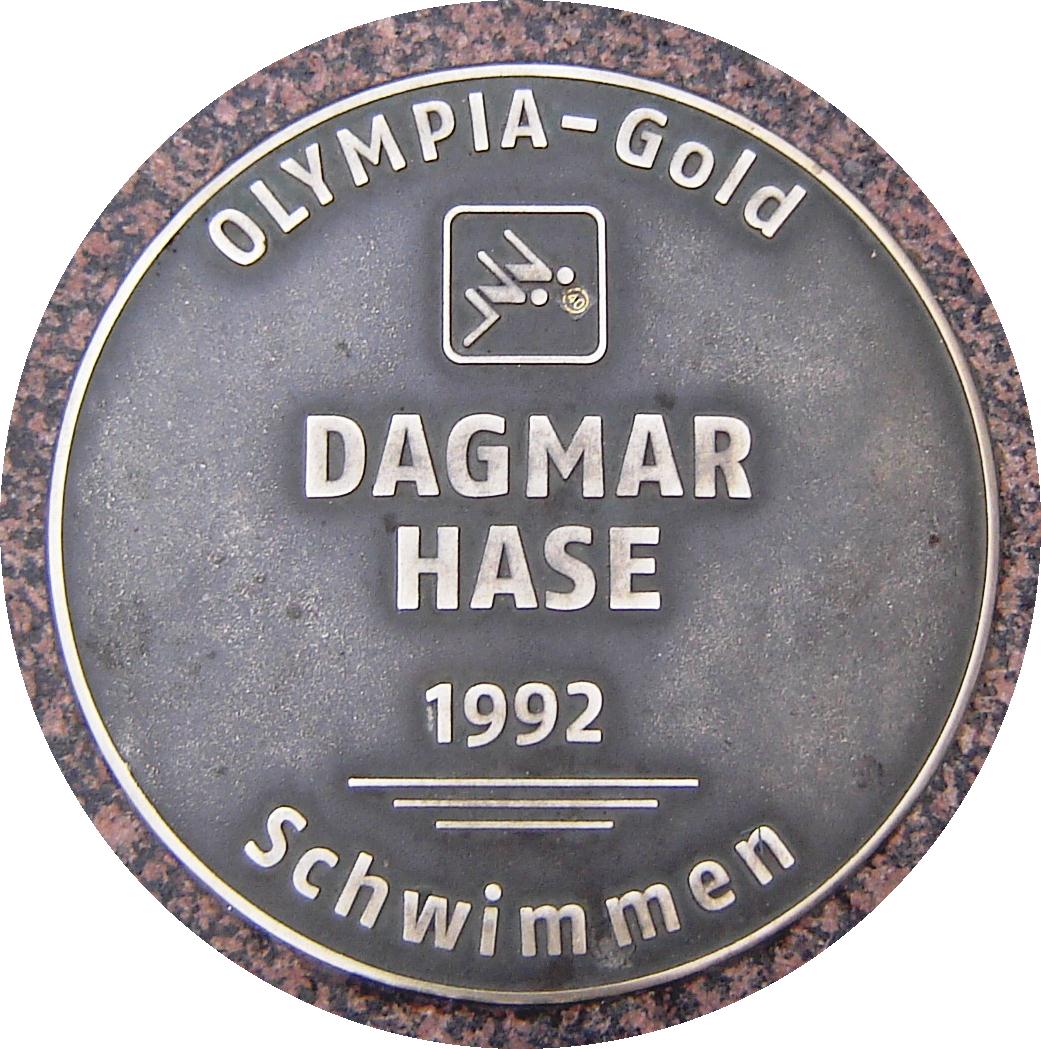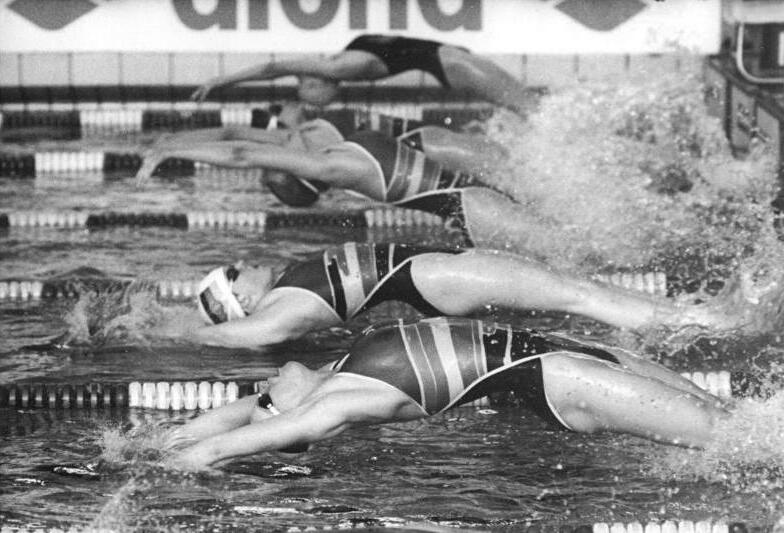1. Overview
Dagmar Hase is a renowned German swimmer who specialized in both freestyle and backstroke disciplines. Throughout her distinguished career, she achieved significant success, becoming an Olympic champion, a World champion, and a European champion. Her numerous medal wins across major international competitions solidified her status as one of Germany's most versatile and successful swimmers.
2. Early Life and Background
Dagmar Hase was born on December 22, 1969, in Quedlinburg, Saxony-Anhalt, which was then part of East Germany. She competed representing Germany. Hase maintained a physical stature suitable for a competitive swimmer, measuring 6.0 ft (1.83 m) in height and weighing 137 lb (62 kg).
3. Swimming Career
Dagmar Hase's professional swimming career was marked by her exceptional versatility and consistent performance in international events, particularly in freestyle and backstroke disciplines. Her career culminated in numerous medals at the highest levels of competitive swimming.
3.1. International Competitions and Major Achievements
Hase's presence was consistently felt at the pinnacle of international swimming, where she earned a multitude of medals across various championships.
3.1.1. Olympic Games
Dagmar Hase participated in two Summer Olympics, showcasing her talent and securing a total of seven Olympic medals.
At the 1992 Summer Olympics in Barcelona, Spain, Hase achieved her most significant Olympic triumph, winning the gold medal in the 400 meter freestyle event. In the same games, she also earned two silver medals: one in the 200 meter backstroke and another as part of the 4 × 100 meter medley relay team.
During the 1996 Summer Olympics in Atlanta, United States, Hase continued her medal-winning streak. She secured three more silver medals, competing in the 400 meter freestyle, the 800 meter freestyle, and the 4 × 200 meter freestyle relay. Additionally, she won a bronze medal in the 200 meter freestyle, further demonstrating her proficiency across multiple freestyle distances.
3.1.2. World and European Championships
Hase's success extended beyond the Olympics to both World and European Championships, where she accumulated an impressive collection of medals.
At the World Championships in Perth, Australia in 1991, she earned a gold medal in the 4 × 200 meter freestyle relay and a silver medal in the 200 meter backstroke. In 1994, at the World Championships in Rome, Italy, Hase contributed to a silver medal win in the 4 × 200 meter freestyle relay. Her final World Championship appearance in Perth, Australia in 1998 saw her claim another gold in the 4 × 200 meter freestyle relay, a silver in the 200 meter backstroke, and a bronze in the 400 meter freestyle.
In the Short Course World Championships, held in Rio de Janeiro, Brazil in 1995, Hase earned two silver medals: one in the 200 meter backstroke and another in the 4 × 200 meter freestyle relay.
Hase also achieved considerable success at the European Aquatics Championships. In 1989, at the championships in Bonn, West Germany, she secured a gold medal in the 200 meter backstroke. The 1991 championships in Athens, Greece, were highly productive for Hase, as she earned three silver medals (4 × 100 meter freestyle relay, 4 × 200 meter freestyle relay, and 4 × 100 meter medley relay) and two bronze medals (100 meter backstroke and 200 meter backstroke). At the 1993 championships in Sheffield, England, she won two gold medals in the 400 meter freestyle and the 4 × 200 meter freestyle relay. Further European success came at the 1995 championships in Vienna, Austria, with a gold in the 4 × 200 meter freestyle relay and a silver in the 200 meter backstroke. Her final European Championship medals were won in Seville, Spain in 1997, where she secured two more gold medals in the 400 meter freestyle and the 4 × 200 meter freestyle relay.
3.2. Notable Achievements and Versatility
Dagmar Hase's career is marked by several significant achievements that underscore her exceptional talent and versatility in the pool.

One of her most notable victories was at the 1992 Barcelona Olympics, where she defeated American swimming legend Janet Evans in the 400 meter freestyle. This was a remarkable feat, as it represented Evans's only loss in a 400 or 800 meter freestyle event between 1986 and 1994.
Hase also famously triumphed over Hungary's Krisztina Egerszegi, widely considered one of the greatest backstrokers of all time, in her strongest event, the 200 meter backstroke, at the 1989 European Aquatics Championships. This victory was particularly significant as it was Egerszegi's only defeat in the 200 meter backstroke from 1987 until her retirement in 1996, and her only defeat in any backstroke event from 1989 to 1994.

Hase demonstrated extraordinary versatility throughout her career, earning at least one Olympic medal and numerous other major event medals in a wide range of distances, including the 200 meter freestyle, 400 meter freestyle, 800 meter freestyle, and 200 meter backstroke. This ability to excel across various strokes and distances made her a formidable competitor.
Beyond her athletic prowess, Hase also displayed commendable sportsmanship. At the 1994 World Championships, she qualified as the eighth-best swimmer for the 200 meter freestyle event. However, her teammate Franziska van Almsick had achieved only the ninth-best qualification time. In a gesture of support, Hase relinquished her starting position, allowing van Almsick to compete. Van Almsick subsequently went on to win the gold medal in the final, setting a new world record.
4. Legacy
Dagmar Hase left a significant and lasting impact on German and international swimming. Her career is remembered for her exceptional versatility, allowing her to compete and win medals across a diverse array of freestyle and backstroke events and distances. As an Olympic champion, World champion, and European champion, she stands as a highly decorated and successful athlete who made considerable contributions to the sport. Her victories over formidable rivals like Janet Evans and Krisztina Egerszegi, combined with her display of sportsmanship, further cemented her legacy as not only a talented swimmer but also a respected figure in the history of competitive swimming.